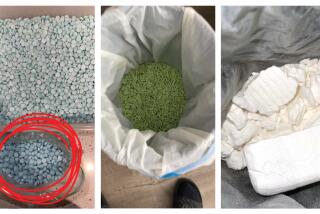On Road to Ruin, Teen-Ager Gets Help Making a U-Turn
- Share via
Anna and Jonathan act like the typical mother and teen-age son, even though they’re not related. She nags him about the cruddy food he eats and pokes fun when he flirts with girls. He bums quarters for video games and asks her advice on getting a job.
So it was no surprise when they recently shared that familiar adolescent rite of passage, the driver’s license test at the Department of Motor Vehicles. As Jonathan queued up with other motorists waiting to take the road test, Anna worried about whether he’d had enough practice.
“This is the first time he’s driven it since he stole it,” she explained, squinting at her Jeep Cherokee.
After a two-year odyssey in the criminal justice system, Jonathan McDonald has taken a major step toward independence in the very car he stole from Anna Hamilton Phelan, his most recent, and certainly most trusting, victim. The 19-year-old, who spent 18 months in a youth prison before entering a halfway house in February, now chalks up her intervention in his life to the grace of God.
*
Almost since the night of April 6, 1992, when McDonald swiped the Jeep from Phelan’s Santa Monica house, Phelan, a 52-year-old screenwriter and mother of two grown children, has helped mentor the streetwise kid from South-Central Los Angeles, who had been a stranger to privilege and family for much of his life.
Their unlikely relationship comes at a time of rising
concern over juvenile crime. According to FBI statistics, 44% of the people arrested for vehicle theft in 1992 were, like McDonald, under the age of 18.
“There’s so much crime committed by youth these days, and (finding a solution) really falls in everybody’s lap,” Phelan said. “Jonathan’s going to prison for however many years is really not going to solve anything.”
Nancy MacDonald, a supervisor at the California Youth Authority in Paso Robles, where McDonald had been held before his transfer to the halfway house, said she has never heard of another case of a victim helping a perpetrator in her 19 years as a corrections counselor. But she applauded the pair for their courage: “Hopefully this will lead to a successful parole for (McDonald). That’s what we want.”
Others questioned Phelan’s motives at first but were eventually won over.
“I think she’s sincere,” said McDonald’s state parole officer, who declined to be identified by name. “The staff at Paso was kind of leery about what the real relationship was because they had never seen a victim help a prisoner before. But I think it’s admirable. I sure wouldn’t help someone who stole my car.”
“What Anna’s doing in her personal life is a little Don Quixote-ish,” said a friend, Janet Yang, the president of Ixtlan Corp., director Oliver Stone’s production company. “But sometimes it does take people who (seem) naive and idealistic to break down barriers.”
Phelan and McDonald make a strange duo. A show business insider, she is a former New York stage actress who went on to write the scripts for the critically acclaimed films “Mask” and “Gorillas in the Mist.” McDonald likes different fare: Danielle Steel novels, NBA basketball and the animated TV show “Tiny Toon Adventures.”
He dresses in basketball high tops and baggy jeans belted low on his wiry frame, every now and then flashing a wide, movie star smile. Phelan, meanwhile, is a model of artsy understatement, garbed in an elegant black tunic and white socks, her blonde mane salted with a few gray strands.
“She’s almost too nice of a person, too giving,” said McDonald, describing his benefactor to a visitor during a pizza lunch celebrating his passing the driving test. Phelan paid for the meal, though she was quick to point out that McDonald has promised to repay her once he comes into a little money.
Phelan’s generosity provides a rare example for McDonald. He grew up in the small east Texas town of Jacksonville, living with his mother after his parents’ divorce. He got into trouble at school and at the age of 15 was sent to stay with his aunt, Darlean Ross, who lives in South-Central.
“When I went and got Jonathan, he didn’t even look at me. He was like a cake of ice,” Ross said.
Although the boy slowly began to trust her, Ross said, he quarreled with her ex-husband, who was still living with the family, and started hanging out with “the wrong boys.” Not long after moving to Los Angeles, the teen-ager pocketed a screwdriver at a friend’s house and used it to steal his first car.
“It took me an hour and a half to do it, but I took it,” he said. “I gave it to my ‘homeys,’ because I didn’t know what else to do with it.”
Jonathan free-lanced about 50 car thefts for various chop shops around town. He said he netted at least $1,000 for each one and blew the money on clothes and guns.
The night of the Phelan theft, he was casing cars in Santa Monica Canyon, where Phelan lives with her husband, attorney Chip Post. McDonald said he settled on Phelan’s car because he saw it had a nice cellular phone. After breaking the vent window and working on the steering column for a couple minutes, he found himself headed back to South-Central in the Jeep. Police arrested him later that night a few blocks from his house, he said.
Enter Phelan, whose as-yet unproduced screenplay about a man who spent 20 years in California prisons had given her a keen interest in juvenile crime. (Phelan firmly balked at the idea of turning this story into another screenplay. “There are screenplays and then there is real life. The two are very different,” she said.)
Using court records, she tracked down McDonald at the Youth Authority.
“After meeting him, I knew this was a young man on the brink and extremely supportive of any help he could get,” Phelan said. “He was extremely smart, funny and just needed a support network under him.”
“When she came to see me, I thought she had some kind of death wish out for me,” McDonald said. “She said she wanted to help me, but I thought she was lying.” But his distrust soon evaporated: “It was in her eyes--you know, that motherly, caring feeling.”
Phelan began visiting McDonald and, using her screenplay research, put him in touch with Lonnie Morris, a San Quentin inmate and activist serving a life term for a 1977 murder. Morris wrote McDonald letters encouraging him to give up crime and get a job and an education.
“This kid started off just like I started off,” Morris said in a phone interview from San Quentin. “He’s borderline. Without a good support system, he could go either way. For most kids in the inner city, it’s harder to get out of trouble than it is to get into trouble.”
Phelan said she’s well-aware of the risk that Jonathan may break down and steal again. But if that happens, she said, “I’ll feel that everything was done to support him. A hand was reached out and he was not willing or not capable of taking it. But all of us in Jonathan’s circle are better off for having given it a shot. To do nothing is inexcusable.”
The same day he passed his driving test, McDonald was hired as a $5-an-hour bag boy at a local supermarket. It’s a lot less money than he made stealing cars, but that’s OK, he said. He wants to get into the movie business someday and maybe help steer other troubled youths away from crime.
Heading back to the Jeep after lunch, Phelan asked McDonald if he still had the car keys. He patted his front and back pockets and appeared for a moment to have misplaced them.
“Not used to getting in a car that way, are you?” Phelan joked.
McDonald dug further down into his pocket and pulled out the keys. He smiled and kept walking.
More to Read
Sign up for Essential California
The most important California stories and recommendations in your inbox every morning.
You may occasionally receive promotional content from the Los Angeles Times.














